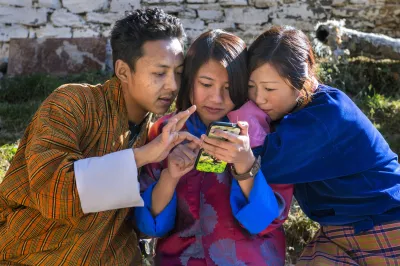Agent Networks: Vital to COVID-19 Response, in Need of Support
With many countries in lockdown to slow the spread of COVID-19 and the global economy slumping, digital payments are proving to be a critical lifeline for hundreds of millions of people. Over 133 countries have introduced or adapted social protection and jobs programs that rely on government-to-person (G2P) cash transfers. Remittances also continue to be essential. However, digital payments cannot reach people in need without functioning cash-in and cash-out (CICO) networks of bank branches, ATMs and agents. The most far-reaching of these among low-income customers — agent networks — are struggling and often are overlooked by policy makers. Based on CGAP and the Bill & Melinda Gates Foundation and its partners' work to improve the global reach and quality of CICO networks over the past two years, here are a few questions that policy makers must answer to ensure agents reach as many people as possible with assistance during and after the crisis.

As nonessential businesses are closed in many parts of the world, countries are having to decide what counts as an “essential service.” While virtually every country considers bank branches and ATMs to be essential, this is not the case for agents. This is despite the fact that agent networks can have up to 20 times the reach of bank branches and seven times the reach of ATMs, according to GSMA and the University of Washington.
This may be due to the diversity of agent networks. Some are fully dedicated to the business of financial services, but for many others, serving as an agent is just one of several business activities. Many agents sell airtime, groceries, office supplies, agricultural inputs or pharmaceutical products. Often, local authorities look at agents’ nonfinancial businesses only to determine whether they must close shop, irrespective of whether financial agents are declared essential.
In India, for example, all types of financial agents have been declared essential services. However, many agents who also offer nonfinancial services have had to close as local authorities are unsure of what criteria to use. This type of nondedicated agent is more prevalent in the country’s urban areas, while in rural areas, agents tend to be dedicated to financial services only and represent state-owned banks. As a result, we hear that a larger percentage of urban agents have been closed. The situation is improving as the value of G2P funds disbursed increases and clarifications on which agents should remain open are made.
Similar confusion is reported in countries like Colombia, Kenya, Lesotho and Zimbabwe, where the majority of agents active in both rural and urban areas manage businesses that fall into both the essential and nonessential categories.
Declaring agent networks to be essential is an important step toward keeping agents open, active and liquid. However, governments should account for the diversity of agent networks in their countries, detailing who qualifies as a financial agent to avoid unintended closures. It is also important to recognize which types of agents are best equipped to serve rural or urban areas or different customer segments. A nuanced understanding of agent networks can help countries prioritize scarce resources to support the types of agents who can reach the most vulnerable people in need of assistance.
Even if governments allow dedicated and nondedicated agents alike to remain open for business, agents may struggle to remain operational as local economies slow and agent transactions and revenue decrease. Enforcing a declaration that agents provide essential services comes with additional costs that likely will need to be shared based on agreements between digital financial services (DFS) providers and governments. Such agreements will require governments and other supporting actors to consider the costs that providers and agents face to keep the agent networks operational in normal times, as well as additional costs stemming from the COVID-19 pandemic.
For agents, these additional costs include lost income due to a drop in transactions. DFS providers may incur costs to ensure the safety of their staff and agents at a time when revenue is declining due to an economic slowdown. Providers also may need to bear the cost of keeping bank branches open and liquid in the face of lower transaction volumes, in order to serve not only nearby customers but also agents who need to rebalance their cash and e-money accounts to honor customer CICO requests. When bank branches are closed or open for fewer hours, agent networks for bank and nonbank providers find it harder to manage their liquidity.
There is a risk that governments and other development actors may inadvertently strain DFS providers and agents, leading to closures irrespective of whether agents are declared essential. For example, we have seen governments consider asking providers to absorb all the costs of operating their agent networks under below-normal activity levels while also requesting that providers waive the cash-out fees paid by customers. CICO fees are one of the most significant drivers of provider revenue, representing up to 70 percent of the total. Further, governments may be tempted to ask providers to disburse COVID-related G2P flows at fees that may no longer be viable during the crisis. If such pressures are enforced for extended periods of time, they could jeopardize the long-term stability of some countries’ CICO networks, putting them in a more vulnerable position in future crises.
Some social safety net programs have been increasingly conscious of the diverse agent cost structure. The Inua Jamii social safety net program in Kenya designed a tiered fee structure for providers that offers higher incentives to rural agents. The Indian government is offering temporary subsidies to mostly rural agents representing state banks, which helps offset the losses they face while operating during the lockdown.
Keeping CICO networks operational during the crisis will require careful coordination between governments and providers. This implies an adequate understanding of provider costs in urban and rural settings and an honest dialogue that results in the most viable way to share these costs, as all stakeholders look to mitigate the negative consequences of COVID-19 on people’s lives and the country’s economy.
Ongoing government efforts to support DFS providers and their agents include a mix of temporary incentive or subsidy measures like tax relief for strategic providers, allowing providers to access interest revenue from escrow accounts where e-wallet balances are held, direct subsidies for agents operating in rural areas and adequate and tiered provider fees to distribute G2P funds. Similarly, we have seen DFS providers temporarily cover a share of agent incentives, help agents advocate for government support, develop health information packages for agents, waive fees on wallet-to-wallet or wallet-to-bank transactions and increase agent liquidity management support, by offering more flexible agent loan programs.
Can we expand CICO networks to places where they are most needed?
Beyond maximizing the share of agents that remain operational, governments should ask themselves whether there are any short-term opportunities to expand agents’ reach and quality to underserved rural or urban areas.
There are markets where past investments in payment infrastructure have resulted in low-hanging fruit that could be captured relatively easily. For example, current Indonesian regulations limit full CICO services to agents managed by banks and exclude the vast agent network developed by nonbank e-money issuers (EMIs). This constrains the country’s potential distribution capacity. A regulatory change would allow nonbank EMIs to convert many of their millions of agents into CICO points.
These types of regulatory changes also can enable policy changes related to G2P distribution that expand the number and types of providers eligible to distribute transfers to low-income customers. This would allow greater customer choice in terms of where their benefits are deposited and use of provider agents that are more convenient for the customer. Countries where this type of policy changes have been made include Zambia, Bangladesh and India.
Governments should explore short-term opportunities to expand the reach and quality of the agent network, building on already-identified enhancing policies or regulation changes. If enabled, these changes can allow new players or business models to quickly add to a country’s distribution capacity to deal with the current as well as future crises.
Emilio Hernandez is a senior financial sector specialist at CGAP. David Kim is a program officer on the Financial Services for the Poor team at the Bill & Melinda Gates Foundation. Over the past two years, CGAP and the Bill & Melinda Gates Foundation and its partners have researched the economics and policy levers of different CICO models, developed recommendations on how to improve the reach and quality of CICO networks in rural areas, explored how CICO networks can be gender transformative and set up an innovation lab to test new CICO models.
In future blog posts, we will continue to draw insights from this work that are relevant to the COVID-19 crisis. We will also share information about actions governments and providers are taking to support CICO agents and the results they are starting to see. We invite you to use the comments section below to share challenges and opportunities you see in the markets you work in.




Add new comment